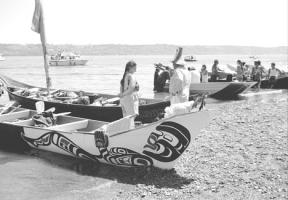“Paddles up, warriors.”
That was the cry heard from tribal paddlers as they left the shores of Whidbey Island in dug-out canoes Monday afternoon.
About 25 canoes, many hand-carved, with more than 100 paddlers landed at Possession Point Park for a brief rest before heading to their final destination, Tulalip Nation near Marysville.
They were participating in Tribal Journey 2003, an annual cultual event involving nearly 50 tribes from the United States and Canada. Each year a different tribe hosts the event. This year’s host is the Tulalip Tribe.
The paddlers have been at sea for two weeks, camping along the way with support boats and cars carrying all the extra supplies. Some paddlers have traveled from as far away as the northwest corner of Vancouver Island, braving the Pacific Ocean in the relatively small vessels.
But with each stroke of their paddles and mile of ocean behind them, the men and women re-enacted the experiences of their ancestors. While the canoe journey is physically challenging, it is also a spiritual experience for many.
Chief Frank Nelson, who paddled from Victoria said, “This is a resurgenace of culture and unity of all the Northwest tribes and an opportunity to teach our young people our customs.”
“While on the water, there are special moments where we sing and urge our young people to stay free of drugs and alcohol, in order to stay in touch with their heritage,” Nelson said.
“I tell them to look in the water as we paddle. If they look deeply enough they will see their ancestors in their own reflection,” Nelson said.
Seen up close, the oceangoing canoes seem small; ranging in size from 30 to 45 feet long and about 4 feet at their widest point. Some carry as few as six paddlers and as many as 23 in one. Many are hand-carved from cedar trees and painted in traditional Native designs.
Only a handfull of Whidbey Islanders were on the beach as the canoes landed.
Clinton resident, Corrine Clausen and her 9-year-old granddaughter, Sydney Hauser, watched from the pier.
“I think it is a wonderful thing for them to do. Keeping their culture alive as a group,” Clausen said.
One paddlers tells of experiencing a real awakening on the journey.
Ray Fryberg Jr., a member of the host tribe is making the journey for the first time. Minutes before the canoes push off from Possession Point, Fryberg led the canoe captains in a native prayer. From Whidbey Island they were headed to Hat Island for lunch then to Tulalip Bay.
“The power of all these people coming together is unbelievable. For those of us who are on the journey for the first time, it’s about reclaiming our culture,” Fryberg said.
The first such canoe journey was was the Paddle to Seattle in 1989 and the revival of ocean going Tribal Journeys was in 1993 to Bella Bella in British Columbia.
Tribes represented this year include Tulalip, Ahousaht, Huuayaht, Ucluelet, Kyuquot, Mowachat Hesquiaht, Ditidaht, Pacheedaht, Makah, Elwha, Clallam Bay, Port Angeles, Jamestown, Port Townsend, Port Gamble, Suquamish, Nanoose, Nanaimo, Kulleet Bay, Cowichan, Tsartlip, Pauquachin, Tseycum, Tsawout, Songees-Esquimalt, Taholah, Hoh, La Push, Ozette, Lummi, Swinomish-Samish, Friday Harbor, Squaxin Island, Nisqually, Puyallup, Muckleshoot, Tswassen, Squamish, Sechelt, and Sliammon.



